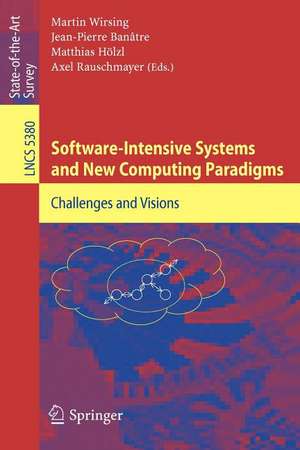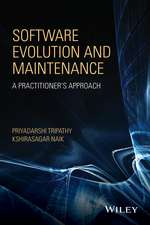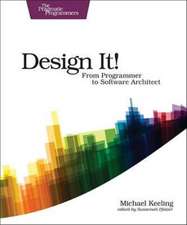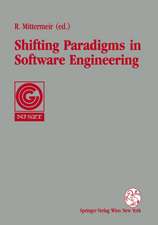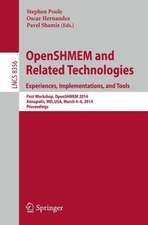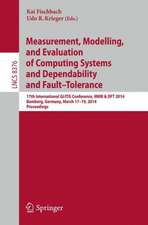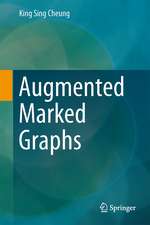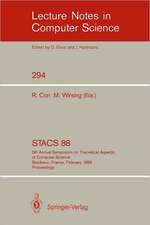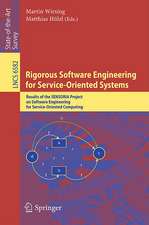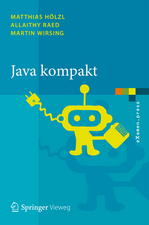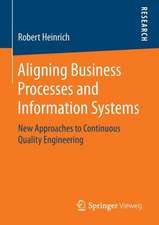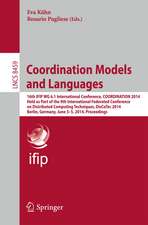Software-Intensive Systems and New Computing Paradigms: Challenges and Visions: Lecture Notes in Computer Science, cartea 5380
Editat de Martin Wirsing, Jean-Pierre Banatre, Matthias Hölzl, Axel Rauschmayeren Limba Engleză Paperback – 6 noi 2008
Din seria Lecture Notes in Computer Science
- 20%
 Preț: 1061.55 lei
Preț: 1061.55 lei - 20%
 Preț: 307.71 lei
Preț: 307.71 lei - 20%
 Preț: 438.69 lei
Preț: 438.69 lei - 20%
 Preț: 645.28 lei
Preț: 645.28 lei -
 Preț: 410.88 lei
Preț: 410.88 lei - 15%
 Preț: 580.46 lei
Preț: 580.46 lei - 17%
 Preț: 427.22 lei
Preț: 427.22 lei - 20%
 Preț: 596.46 lei
Preț: 596.46 lei -
 Preț: 449.57 lei
Preț: 449.57 lei - 20%
 Preț: 353.50 lei
Preț: 353.50 lei - 20%
 Preț: 1414.79 lei
Preț: 1414.79 lei - 20%
 Preț: 309.90 lei
Preț: 309.90 lei - 20%
 Preț: 583.40 lei
Preț: 583.40 lei - 20%
 Preț: 1075.26 lei
Preț: 1075.26 lei - 20%
 Preț: 310.26 lei
Preț: 310.26 lei - 20%
 Preț: 655.02 lei
Preț: 655.02 lei - 20%
 Preț: 580.93 lei
Preț: 580.93 lei - 20%
 Preț: 340.32 lei
Preț: 340.32 lei - 18%
 Preț: 938.83 lei
Preț: 938.83 lei - 20%
 Preț: 591.51 lei
Preț: 591.51 lei - 15%
 Preț: 438.59 lei
Preț: 438.59 lei - 20%
 Preț: 337.00 lei
Preț: 337.00 lei -
 Preț: 389.48 lei
Preț: 389.48 lei - 20%
 Preț: 607.39 lei
Preț: 607.39 lei - 20%
 Preț: 1024.44 lei
Preț: 1024.44 lei - 20%
 Preț: 579.30 lei
Preț: 579.30 lei - 20%
 Preț: 763.23 lei
Preț: 763.23 lei - 20%
 Preț: 453.32 lei
Preț: 453.32 lei - 20%
 Preț: 575.48 lei
Preț: 575.48 lei - 20%
 Preț: 585.88 lei
Preț: 585.88 lei - 20%
 Preț: 825.93 lei
Preț: 825.93 lei - 20%
 Preț: 763.23 lei
Preț: 763.23 lei - 17%
 Preț: 360.19 lei
Preț: 360.19 lei - 20%
 Preț: 1183.14 lei
Preț: 1183.14 lei - 20%
 Preț: 340.32 lei
Preț: 340.32 lei - 20%
 Preț: 504.57 lei
Preț: 504.57 lei - 20%
 Preț: 369.12 lei
Preț: 369.12 lei - 20%
 Preț: 583.40 lei
Preț: 583.40 lei - 20%
 Preț: 343.62 lei
Preț: 343.62 lei - 20%
 Preț: 350.21 lei
Preț: 350.21 lei - 20%
 Preț: 764.89 lei
Preț: 764.89 lei - 20%
 Preț: 583.40 lei
Preț: 583.40 lei - 20%
 Preț: 649.49 lei
Preț: 649.49 lei - 20%
 Preț: 341.95 lei
Preț: 341.95 lei - 20%
 Preț: 238.01 lei
Preț: 238.01 lei - 20%
 Preț: 538.29 lei
Preț: 538.29 lei
Preț: 332.06 lei
Preț vechi: 415.08 lei
-20% Nou
Puncte Express: 498
Preț estimativ în valută:
63.54€ • 66.52$ • 52.57£
63.54€ • 66.52$ • 52.57£
Carte tipărită la comandă
Livrare economică 05-19 aprilie
Preluare comenzi: 021 569.72.76
Specificații
ISBN-13: 9783540894360
ISBN-10: 3540894365
Pagini: 280
Ilustrații: X, 267 p.
Dimensiuni: 155 x 235 x 15 mm
Greutate: 0.41 kg
Ediția:2008
Editura: Springer Berlin, Heidelberg
Colecția Springer
Seriile Lecture Notes in Computer Science, Programming and Software Engineering
Locul publicării:Berlin, Heidelberg, Germany
ISBN-10: 3540894365
Pagini: 280
Ilustrații: X, 267 p.
Dimensiuni: 155 x 235 x 15 mm
Greutate: 0.41 kg
Ediția:2008
Editura: Springer Berlin, Heidelberg
Colecția Springer
Seriile Lecture Notes in Computer Science, Programming and Software Engineering
Locul publicării:Berlin, Heidelberg, Germany
Public țintă
ResearchCuprins
Engineering of Software-Intensive Systems: State of the Art and Research Challenges.- Engineering of Software-Intensive Systems: State of the Art and Research Challenges.- I Ensemble Engineering.- Software Engineering for Ensembles.- Change-Enabled Software Systems.- On the Challenge of Engineering Socio-technical Systems.- Design of Complex Cyber Physical Systems with Formalized Architectural Patterns.- Cyber-Physical Systems and Events.- Design and Deployment of Large-Scale Software-Intensive Systems in Urban Districts.- II Theory and Formal Methods.- Formal Ensemble Engineering.- Structured Interacting Computations.- Extending Formal Methods for Software-Intensive Systems.- Ensemble Engineering and Emergence.- Mathematical Support for Ensemble Engineering.- Behaviour Equivalences in Timed Distributed ?-Calculus.- III Novel Computing Paradigms.- The Chemical Reaction Model Recent Developments and Prospects.- Spatial Organization of the Chemical Paradigm and the Specification of Autonomic Systems.- Emerging Models of Computation: Directions in Molecular Computing.
Textul de pe ultima copertă
To identify the emergent trends in software-intensive and distributed and decentralized computer systems and their impact on the Information Society in the next 10--15 years, the European Commission has established two Coordinated Actions: Initially the project `Beyond the Horizon' and then, starting in 2006, the project `InterLink'.
This state-of-the-art survey presents the results of three workshops of the InterLink working group on software-intensive systems and novel computing paradigms. The objective was to imagine the landscape in which next generations of software-intensive systems will operate and the challenges they present to computing, software engineering, cognition and intelligence.
The volume starts with an overview of the current state of the art and the research missions in engineering software-intensive systems. The remainder of the book consists of 15 invited papers of the working group participants and is structured in three major parts: ensemble engineering, theory and formal methods, and novel computing paradigms. These papers cover a broad spectrum of relevant topics ranging from methods, languages and tools for ensemble engineering, socio-technical and cyber-physical systems, ensembles in urban environments, formal methods and mathematical foundations for ensembles, orchestration languages to disruptive paradigms such as molecular and chemical computing.
This state-of-the-art survey presents the results of three workshops of the InterLink working group on software-intensive systems and novel computing paradigms. The objective was to imagine the landscape in which next generations of software-intensive systems will operate and the challenges they present to computing, software engineering, cognition and intelligence.
The volume starts with an overview of the current state of the art and the research missions in engineering software-intensive systems. The remainder of the book consists of 15 invited papers of the working group participants and is structured in three major parts: ensemble engineering, theory and formal methods, and novel computing paradigms. These papers cover a broad spectrum of relevant topics ranging from methods, languages and tools for ensemble engineering, socio-technical and cyber-physical systems, ensembles in urban environments, formal methods and mathematical foundations for ensembles, orchestration languages to disruptive paradigms such as molecular and chemical computing.
